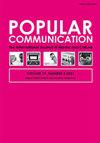NEW COMMONS: TOWARDS A NECESSARY REAPPRAISAL
IF 1.8
Q2 COMMUNICATION
引用次数: 4
Abstract
ABSTRACT The Free and Open Source Software (FOSS) movement has been a crucial source of inspiration and theorization for the contemporary rediscovery of the commons. However, its growing organic integration into the industry, into the market and into a group of innovative forms of capitalistic competition is challenging the early interpretations of this phenomenon and, at the same time, is shedding new light on the forms that these new commons can take and on the potential role they will play in the new productive arrangements that are emerging on the frontier of the digital revolution. This article engages with these new evolutions and develops innovative approaches to this phenomenon. Specifically, it makes an original contribution in two directions. The first is by developing a new framework for analyzing the relationships between commons and markets. The framework is organized under three concepts: semi-commons, shared infrastructures and creation of ecosystems. As a whole, the framework highlights the importance of studying these new commons within hybrid combinations of regimes of property and economic appropriation. The second contribution is the development of interpretative keys for analyzing the evolution of the FOSS ecosystem. This is carried out through the experimental application of two frameworks of analysis to this phenomenon: the multi-level perspective and the theory of the techno-economic paradigms. These contributions allow us to draw conclusions regarding new directions for research and policy on FOSS and the new commons.新公地:走向必要的重新评估
自由和开放源码软件(FOSS)运动是当代重新发现公共领域的重要灵感和理论来源。然而,它日益有机地融入行业、市场和一组创新的资本主义竞争形式,挑战了对这一现象的早期解释,同时,正在为这些新的公域可以采取的形式以及它们将在数字革命前沿出现的新的生产安排中发挥的潜在作用提供新的线索。本文对这些新的演变进行了研究,并对这一现象提出了创新的方法。具体来说,它在两个方向上做出了独创性的贡献。第一个是开发一个新的框架来分析公地和市场之间的关系。该框架分为三个概念:半共有、共享基础设施和创建生态系统。总的来说,该框架强调了在财产和经济拨款制度的混合组合中研究这些新公地的重要性。第二个贡献是开发了分析自由和开放源码软件生态系统演变的解释性钥匙。这是通过对这一现象的两个分析框架的实验应用来实现的:多层次视角和技术经济范式理论。这些贡献使我们能够就自由和开放源码软件研究和政策的新方向以及新的公共领域得出结论。
本文章由计算机程序翻译,如有差异,请以英文原文为准。
求助全文
约1分钟内获得全文
求助全文

 求助内容:
求助内容: 应助结果提醒方式:
应助结果提醒方式:


